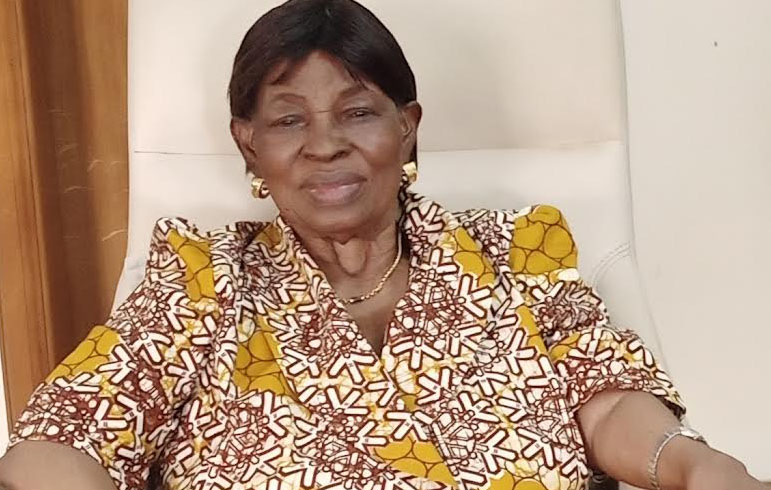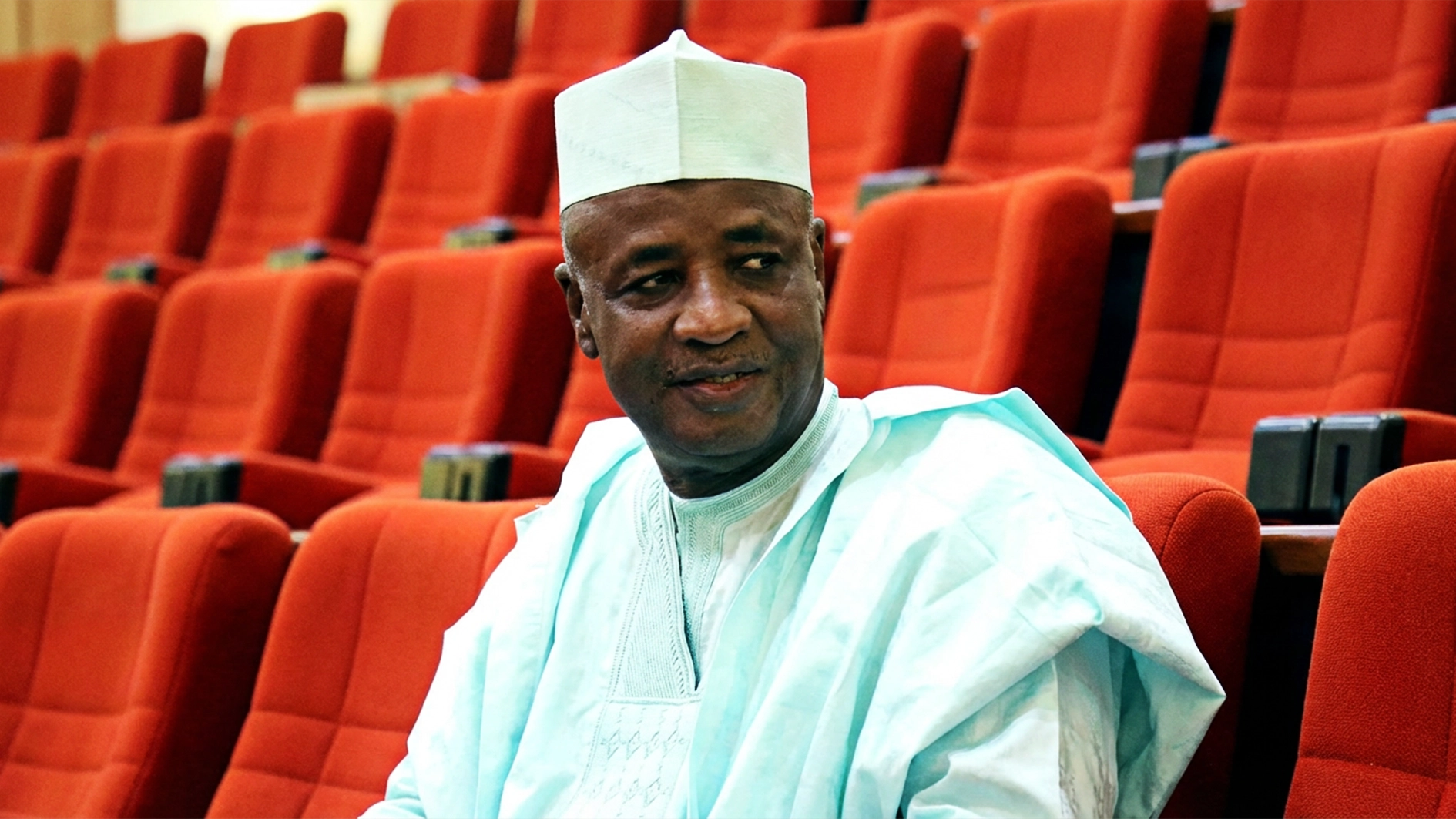
‘Most teachers today don’t want to work but always complain about their pay package’
Mrs. Margaret Olabisi Agbaje, who recently celebrated her 90th birthday, was born at Massey Street Hospital, Lagos Island, on November 19, 1933, to the family of the late Michael Lajuwon Epega of Ode Remo, Ogun State.
She attended primary school at St. Paul’s Breadfruit School, Lagos Island, and was one of the pioneer students of Holy Child College, Ikoyi, Lagos, which she attended from 1945-1950 and where she sat for the Cambridge School Certificate. For her tertiary education, she attended the Holy Child Teacher Training College, Ifuo, Ikot Ekpene, now in Akwa Ibom State from 1951-1952. From 1960-1962, she also attended the College of Education, Hereford, United Kingdom, for further studies in education on a Western Nigeria scholarship.
From 1953-1959, Mrs. Agbaje taught Mathematics at her alma mater, Holy Child College, Lagos. Within this period, she also briefly taught the same subject during her free period at Queens College Lagos when it was situated at Onikan, Lagos Island, following the death of their Mathematics teacher in a plane crash.
She subsequently taught at St. Joseph’s Teacher Training College, Surulere, from January 1960 to January 1971. At the request of the then Catholic Archbishop of Lagos, the late Archbishop J.K. Aggey, she assumed the position of Headmistress of St. Catherine’s Model School, Surulere, where she worked from January 1971 to July 1982.
After her retirement from St. Catherine’s School in 1982, Mrs. Agbaje went into private business. She also became very involved in the activities of the Catholic Women Organisation where she held the positions of President, Lagos Ecclesiastical Province, consisting then of nine dioceses; Vice Chairman Provincial and National Provost. She is also a national awardee of the organisation.
Mrs. Agbaje was Vice Chairman of the Parish Pastoral Council of Holy Cross Cathedral from 1987-1988 and President of the Catholic Ladies Society for many years. She is currently the matron of many church societies including the Guild of Immaculate Conception of the Catholic Church of the Assumption, Falomo-Ikoyi, and Holy Cross Cathedral and the Catholic Men Organisation of Holy Cross Cathedral, among others.
Mrs. Agbaje was married to the late Sir Julius Kosebinu Agbaje in 1956, an old boy of St. Gregory’s College, Lagos, who was the first indigenous Executive Director of Standard Bank of Nigeria (now First Bank of Nigeria) and pioneer Chairman of Guaranty Trust Bank Plc and Federal Palace Hotels, among other positions.
In this interview with GBENGA SALAU, she went down memory lane about her life, marriage and teaching career, saying being passionate about teaching pays though the reward may not come immediately.
In a nation where life expectancy is 50 years, how do you feel clocking 90?
Well, I am grateful to God. It is the grace of God; it is a gift from God and I was very excited because you just live year after year and do what you do. And with happiness and the support of your children, being good towards people, love for others, love of God and once you are happy, you are healthy, you eat good food, you socialise with people.
But in all, it is the grace of God; it is a gift and not that there is a way or magic by which you get there.
Are you saying there is no science to living long?
You have to live well; you have to eat well; eat good food, live in a clean environment, look after yourself. Don’t neglect yourself; always live your life fully, it is not about age. Time belongs to God. You live on the love of friends and good children around you. And good children are just the way you have brought them up. If you are lucky that God helped you and you have good children, you won’t have any work; you will be able to always serve your God. Always be close to God and always love God. If you love God, love your neighbour, eat well and live well; you will just find one year, you are 80, another year you are 81 and then you’re 90.
I wish you were around the day I marked 90 years. People who are 95 years old attended the party and they walked to the event. So, if I am 90 and I see those older than me, it is a good inspiration. But I am not anxious about how long I live; no anxiety, because God decides. I’m restful; I’m peaceful.
When you talk about eating well, what do you eat?
I take ogi and moi-moi. I also take ogi (pap) and akara (baked beans) or beans and bread in the morning.
Once a week, I take English breakfast and the rest of the week, I take Nigerian food. I take Nigerian food and I don’t depend on foreign meals. I eat Nigerian dishes.
Being 90 on earth comes with a lot of experiences; what has life taught you?
I was 66 years old when I lost my husband. For me, it was sorrowful, but for the children they were glad, because he died at over 80. So, for the family, it wasn’t so sorrowful. I wasn’t too young when I lost him; I was prepared to be on my own. And by then my children were even married; the boys were married and the girls were also married.
I even lost a daughter; that was the only sort of setback. But if you believe in God, have trust in God, you will overcome.
Life has taught me not to trust anybody but to be honest. It has taught me to love other people because if you don’t love people and the people around you don’t love you, life is not worth living.
For instance, on the day I marked 90 years in the church, though I did not want an elaborate celebration in church, I wanted it was for me and the children, but I was surprised when it was time for thanksgiving, almost all the people got up to thank God with me. I was overwhelmed with joy; that’s the reward of loving people.
Having a smile on your face always is also important. I have learnt to smile; a smile on your face helps you to get things right. If you go somewhere and you’re happy with them, they will want to do everything for you. If not, they will ignore you.
However, you have to live a life of love; love of God and love of your neighbour. You have to serve God. Whatever you can do to serve God, it is very necessary.
You taught Mathematics, a subject that many students detest. Some students even fear their Mathematics teacher. What was your experience like?
If I gave them a test, the people who performed well, when it is break time, I allow those ones to go. I then ask those that did not do well to stay back for 15 minutes. And that’s how and why many of them could read science and became medical doctors. Even when I was in Holy Child, I was asked to teach in Queens College at a time because their mathematics teacher died in a plane crash and they had no teacher to teach the students Mathematics. So, I used to go to Queens College during my free period.
And many of my ex-students, when they meet me or my children, they always say they enjoyed my class and that when I taught, I taught with enthusiasm and zeal.
As a teacher, if after school you can stay back for one hour, I was ready to help you without being paid for the extra class. That is how I helped those who were slow in Mathematics. I enjoyed teaching Mathematics.
Holy Child College was founded in 1945 and very good teachers taught us; they had no other life but to teach, to nurture and to make us become what we are today. We thank God. In fact, it was from them that I decided that if these Sisters could be like this, we also can do better. So that’s why I went into teaching.
How were you able to enjoy teaching and still look after the family?
Teachers come home early. We are not like people who work now and come home very late. Teachers come in early and can still look after their children and the family. We don’t close late; schools don’t close late except those who are having lessons. But if it’s your work, which you are paid for, you are not supposed to close late.
A teacher’s closing time helps. You can combine teaching with being a good mother because you close early to come back home. You also have the weekend; you have Saturday and Sunday. So, in our time it was easier to be a teacher and be a mother.
How did you meet your husband?
I met my husband in church; I was very active in church. We have a youth organisation, which I belonged to and during social events, I was always active and seen. I was always doing something and he is also a person like that. We started talking but he was transferred to Ibadan so we lost contact. On one of his trips to Lagos, by then I had started teaching at Holy Child College, we met again.
From then, when he comes home from Ibadan almost every weekend, he would check on me. He was a good man, and like his children, very handsome, and also very active in the church. And he was getting on in his career as a banker. In fact, he was an accountant by the time we got married. When I met him, he wasn’t. We met in 1954 and we got married in 1956. And we lived together for over 40 years
How did you break the news to your parents?
He was the one who found a way of getting to my mother. He has some friends who were staying close to our house so he told his friends that there is a lady that he would love to marry. Luckily, his friends were friendly with my mother, so they told my mother that one of their friends has interest in her daughter, and asked if he should come to see her. My mother told them that until he discussed it with me and I agreed, she didn’t want to see him. Everyone liked him; if you see all my boys, straight, if you like them, then you would like my husband.
My dad passed away when I was young. I was around five years old when he died. So he was talking to my mother when I agreed to get into a relationship and marriage with him. Our family is a Christian family. Once I have accepted, they would accept. I went to see my grandfather who was still alive and he just said if my husband didn’t drink, he could have me because he said he doesn’t like people who drink.
I lost my dad early, I was only five years old; but I knew him because we were very close. I knew him and he was a good man. Like my husband, tall and straight. But I had a good father. He attended Kings College in Lagos. So, he was one of the first civil servants that rose to the highest level. My father was one of the highly placed civil servants. But he passed away. But because he was in a high position as a civil servant, he had made some provision for us so that we could be able to go to school.
What are your thoughts on teaching in the olden days and what we have today?
Teachers of today always complain about their pay package. Teachers of the olden days believed that God would reward them even though the package was small. Today, most teachers do not want to work. When they teach children in the morning, in the afternoon they keep them in the same classroom and say they are having lessons and collect money again.
Look at what is happening. When the teachers finish in the schools they go to the different homes as lesson teachers. We do not need it. If you taught them very well in the morning, give them homework based on what was taught. That was what we did. The children do not need lessons. My children never went to lesson classes, and they are who they are today.
But now, they stress children, from morning to six in the evening, children in the primary school are still learning. My children went to Catholic schools, and perhaps, because I was a teacher, if they had difficulties, they might bring them to me; not that I sat them down for two to three hours after school.
Don’t you think that the approach adopted by teachers of today has to do with the economic situation in the country?
And so, what shall we do? Neglect our work? Do we neglect our work because of the state of the economy? I know it is difficult because they are poorly paid. I also think that the government should pay teachers something they can live on. At least, we need shelter, food and clothing. If teachers are not well looked after, then the government is not helping them to teach the children. I think the government is at fault too.
Teachers are not well looked after. We did not earn a lot of money in our time as teachers but life was better. Things were not as difficult as they are now. There was an effective public transport system and food wasn’t that expensive. Now, if the market women hear they have increased your salary, the price of garri will go up because they also want to take their own portion of the increased salary.
I think things will improve and teachers should have a different attitude to their work. If you do well, your rewards will come, although it might be later.
Many years ago, my students often came to my house saying they wanted to offer some help to me. But I always told them I didn’t need their help. Go back to your schools and support the school. What if I needed help? That’s how they would have come.
But they still come in and say ‘Mama what can we do for you?’ But I would say, ‘God looks after me. You go back to that school and do something for the school.’
You were married for over 40 years; what helped the relationship?
The husband must love his family while the wife must be submissive. Two masters cannot be in a boat.
As a father, you have to care for your family; some people don’t even give their family food money. As a good father, you must find out how the children will eat. When you get your salary, let your wife know what you have and if you don’t want her to know, tell her what you can give her as maintenance allowance. You don’t just come in and go out. Some men don’t help in the family and make sure they have a place to sleep. I am not saying a big house but at least a comfortable place to stay; wherever you are living should be clean. Wherever there is peace, where there is love, where there is unity and happiness, the family will be good. You can’t fight and box each other. If there is unity, there won’t be any reason for violence.
In some cases, you have greedy wives; they feel there is money and when they don’t get the money they are disappointed. Tell your wife who you are and what you own and don’t deceive her. Tell her what you have and what you don’t have. I work in a place like this; this is what I earn.
Some people get married and they don’t have a job. Can you marry without work? When you don’t earn a salary, can you marry? When you don’t own a place to stay and you are staying in your parents’ place, can you marry? These are things to look at. Is there accommodation for us? Does the man have a job or are you going to depend on the woman’s salary?
I’m sure you know and see it around. When you see couples fighting every day, can they have good children? What sort of home will they build when father knocks mother and mother knocks father or they are talking and cursing each other. What sort of home is that?






